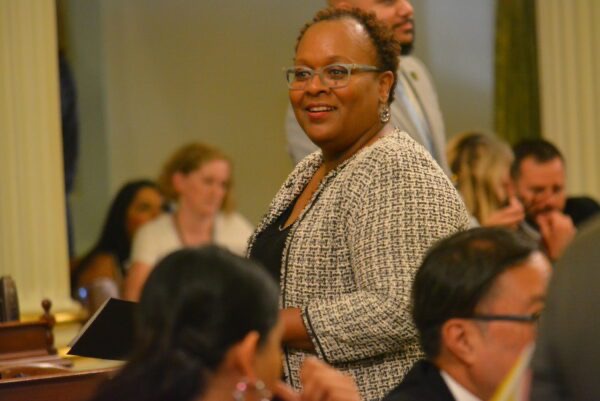Edward Henderson – California Black Media
Assemblymember Lori D. Wilson (D-Suisun City) was elected in a special election in April 2022 to represent California’s 11th Assembly District, which includes all of Solano County and portions of Contra Costa and Sacramento Counties.
Prior to her election to the Assembly, Wilson was the first Black female Mayor to serve in the entire history of Solano County.
In August of 2022, Wilson was elected Chair of the California Legislative Black Caucus (CLBC). Her tenure ended this month.
In the Assembly — and as CLBC Chair — Wilson says she has prioritized bringing state services directly to individuals, local businesses, veterans, non-profits, and local governments. Wilson said her efforts focus on people and organizations that have needed help interacting with government agencies and accessing resources.

A native Californian, raised on the west side of Fresno, Lori is married to her high school sweetheart, Chavares Wilson, a retired Air Force Reserve Technical Sergeant. They have been blessed with two sons, Tyler and Kiren, a daughter-in-law, Brittney, and a grandson, Weston.
California Black Media (CBM)spoke with Wilson about her accomplishments, challenges and lessons she learned over the last year.
Responses have been edited for length and clarity.
Looking back at 2024, what stands out to you as your most important achievement as Chair of the CLBC and why?
The End of Slavery Act — getting that across the finish line and to voters as Prop 6. It was a central piece of our reparations legislative package. It failed last year at the very end. I was so disappointed. But it was good for me to experience that as a brand-new legislator. Just because something is moral and has values associated with it that are consistent with California’s values, that doesn’t mean people will vote for it.
The other involves the bonds. It’s rare for a legislator to be a negotiator on two bonds – Prop 2 and Prop 4 — that made it unto the ballot for voters to decide during the November elections.
How did your leadership contribute to improving the lives of Black Californians?
Well, I think, for sure, there are so many of us; we’re disproportionately impacted by the carceral system, and so if we can get this language changed, I think it will make an impact to ensuring that Black Californians in the system have dignity as well as truly get an opportunity to rehabilitate.
On the education bond, I was instrumental in getting the add-on language for resources like school kitchen facilities to have more access to produce and farmers markets and things like that. As well as urban greening.
On the climate bond, I was instrumental in getting the agriculture section in there with a substantial number of investments. One particular area was to ensure our farmers of color are included.
What frustrated you the most over the last year?
My greatest frustration would be centered around the weaponization of people. Stakeholders in the community who are lobbying directly on bills when they’re not getting their way, or something happens, they go to the community with soundbites and try to weaponize the community against something that might be beneficial. There were a number of bills this year that were like solid bills, and it took forever to undo someone putting it in a negative light.
I think it’s frustrating in this political environment how much misinformation is out there.
What inspired you the most over the last year?
Always people. When people come in and share their stories. When they come in and share their hopes and dreams. Then, you know that the work that you’re doing is so impactful. Now, you have a person in mind that you’ve talked to, that you know, that has been helped. You know that the moment a bill is signed into law, someone’s life is instantly better.
What is one lesson you learned in 2024 that will inform your decision-making next year?
Behind my nameplate, there was a card there since 2015. Somebody wrote down a quote from Jerry Brown. And ever since I found this card on my desk, it’s just been ruminating. And it says, “the challenge is to build for the future, not steal from it.” That is such a profound statement. I’ve just been reflecting on it ever since.
In one word, what is the biggest challenge Black Californians face?
Familiarity. People are so familiar with our struggle that they minimize it. Other people struggle, but ours is so just so familiar that you have to remind people how terrible it is. You have to remind people what racism looks like. You have to remind people what discrimination looks like.
What is the goal you want to achieve most in 2025?
Increasing the quality of life of people in California. It’s always my goal.